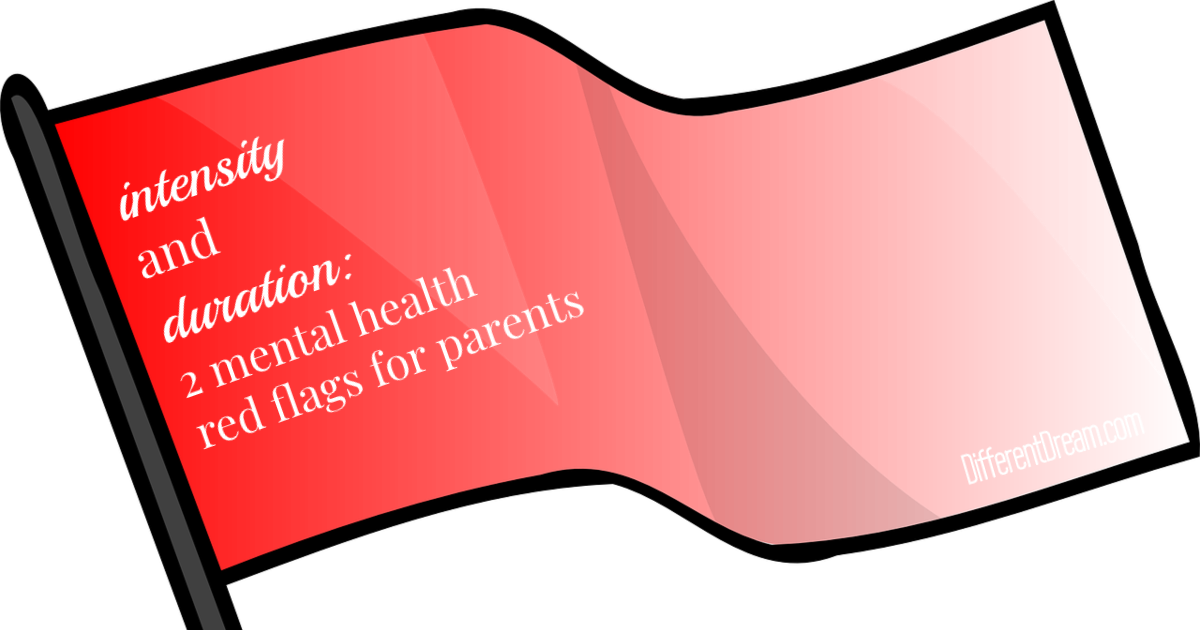2 Mental Health Red Flags for Caregiving Parents

2 mental health red flags for caregiving parents? Are you kidding me? I’m waving at least a dozen red flags every day!
That would have been my reaction to the title of this post when I was in the thick of caring for a medically-fragile kid. In fact, that would have been my reaction as recently as a month ago. But I had a lightbulb moment between then and now.
The lightbulb moment came while I facilitated a class for teachers about post-traumatic stress disorder (PTSD) in kids. We were discussing childhood symptoms, also known as behaviors, displayed by traumatized children. The class members wanted to know what kinds of behaviors are indicators that the trauma has evolved into PTSD.
“It’s not so much the kind of behavior,” I explained, “because most kids display these kinds behaviors at one time or another. Red flag indicators for me are the intensity and duration of the behavior. An example would be what happens after telling 2-year-olds they can’t have a cookie. More than likely, a 2-year-old will throw a tantrum. However, 2-year-olds living with unresolved trauma and PTSD will pitch magnificent fits that are long and loud. That’s intensity.
Similar tantrums continue to occur whenever these 2-year-olds are denied anything long after the child should have moved past the terrible 2s. That’s duration.”
The words had barely come out of my mouth before the lightbulb turned on: Intensity and duration of behaviors can be 2 mental health red flags for caregiving parents, too.
I mean, let’s face it. Parents raising kids with special needs and disabilities face plenty of attacks on their mental health, including traumatic stress. Such as thee stress of overwhelming, unrelenting caregiving demands. The trauma of sending a child off to surgery or hearing the heart monitor flatline. The stress of trying to manage unmanageable behaviors. The trauma of a receiving a difficult diagnosis.
To read the rest of 2 Mental Health Red Flags for Caregiving Parents, visit the Hope Anew website.
Do you like what you see at DifferentDream.com? You can receive more great content by subscribing to the monthly Different Dream newsletter and signing up for the daily RSS feed delivered to your email.
By Jolene
Jolene Philo is the author of the Different Dream series for parents of kids with special needs. She speaks at parenting and special needs conferences around the country. She’s also the creator and host of the Different Dream website. Sharing Love Abundantly With Special Needs Families: The 5 Love Languages® for Parents Raising Children with Disabilities, which she co-authored with Dr. Gary Chapman, was released in August of 2019 and is available at local bookstores, their bookstore website, and at Amazon.
4 Comments
Submit a Comment
Related Posts
My Favorite Vacation Planning Tips for Special Needs Families
Are you traveling this summer? Jolene provides her favorite vacation planning tips for special needs families.
How to Build a Thriving Marriage as You Care for Children with Special Needs
Todd and Kristin Evans explain how to build a thriving marriage as you care for children with special needs.
How Do I Discern if Medication Is Best for my Child’s Behavioral Needs?
Heather Braucher explains her answer to the question, “How do I discern if medication is best for my child’s behavioral needs?”






Thanks, Lisa!
Once again, you offer practical and insightful help on this complex subject. Thank you!
You’re welcome and I wholeheartedly agree. More needs to be done to support and improve caregiver mental health!
Hi Jolene,
As a mother of two children with rare genetic disorders, medical fragility, and developmental disabilities, as well as, a mental health professional, I really appreciate your candid post. From personal experience and studying research, I believe that the deleterious impacts on caregivers’ mental health needs more attention. Thank you!